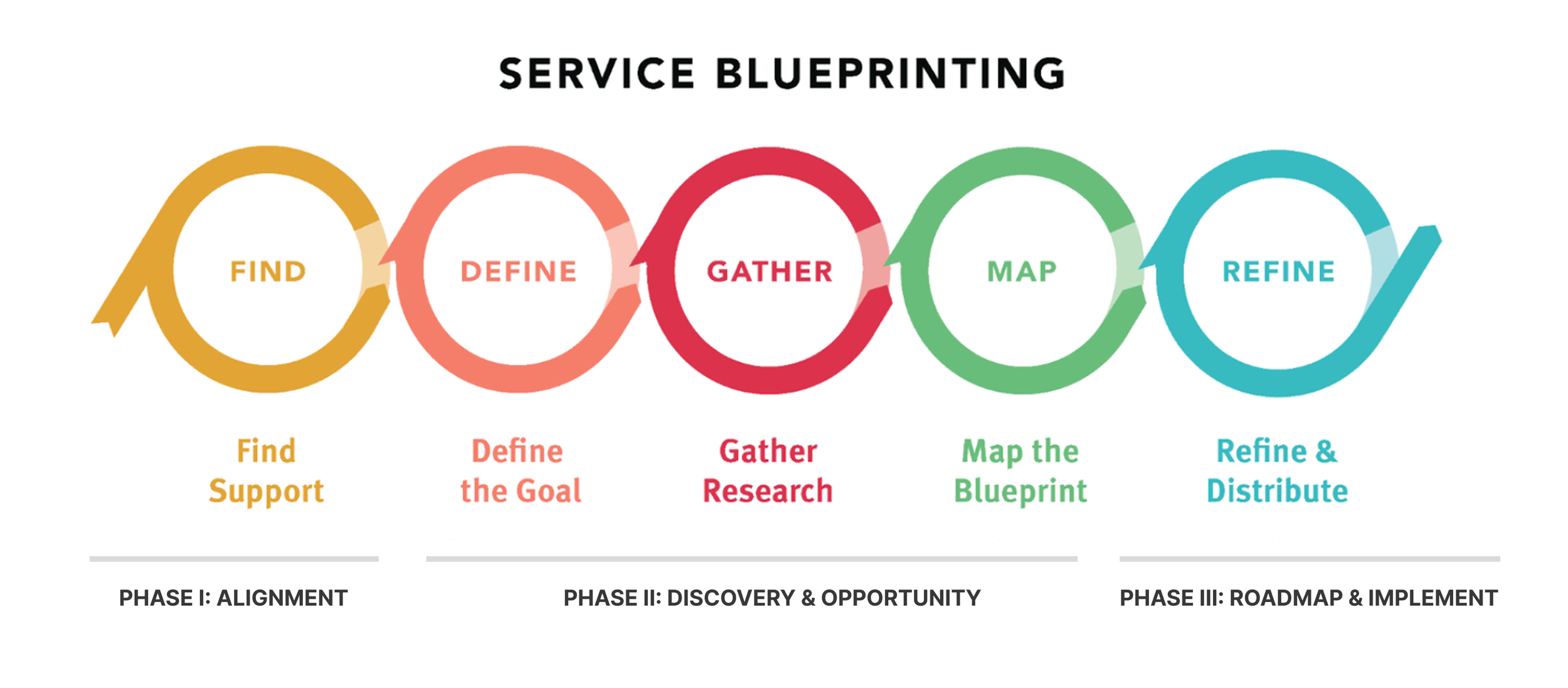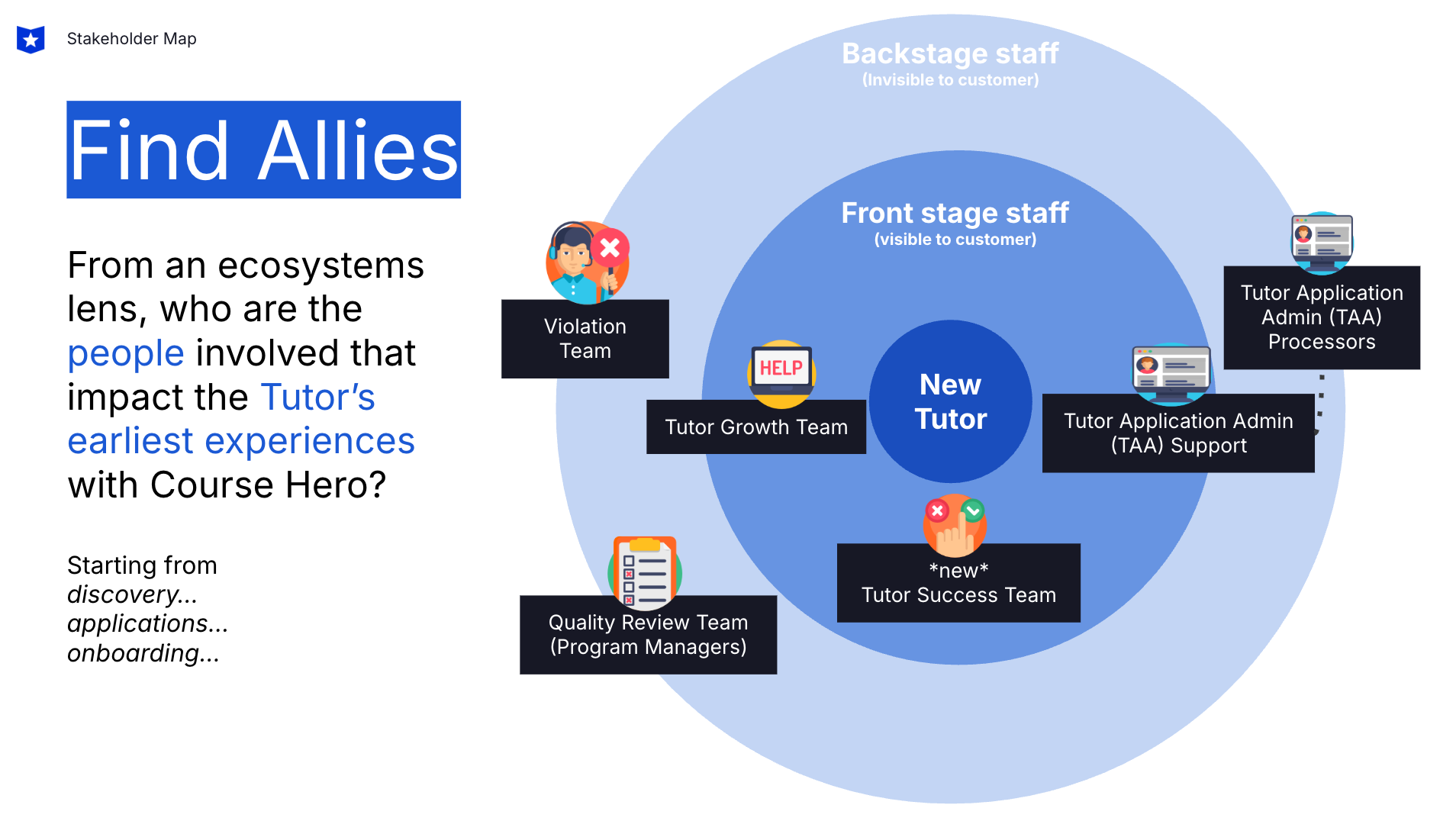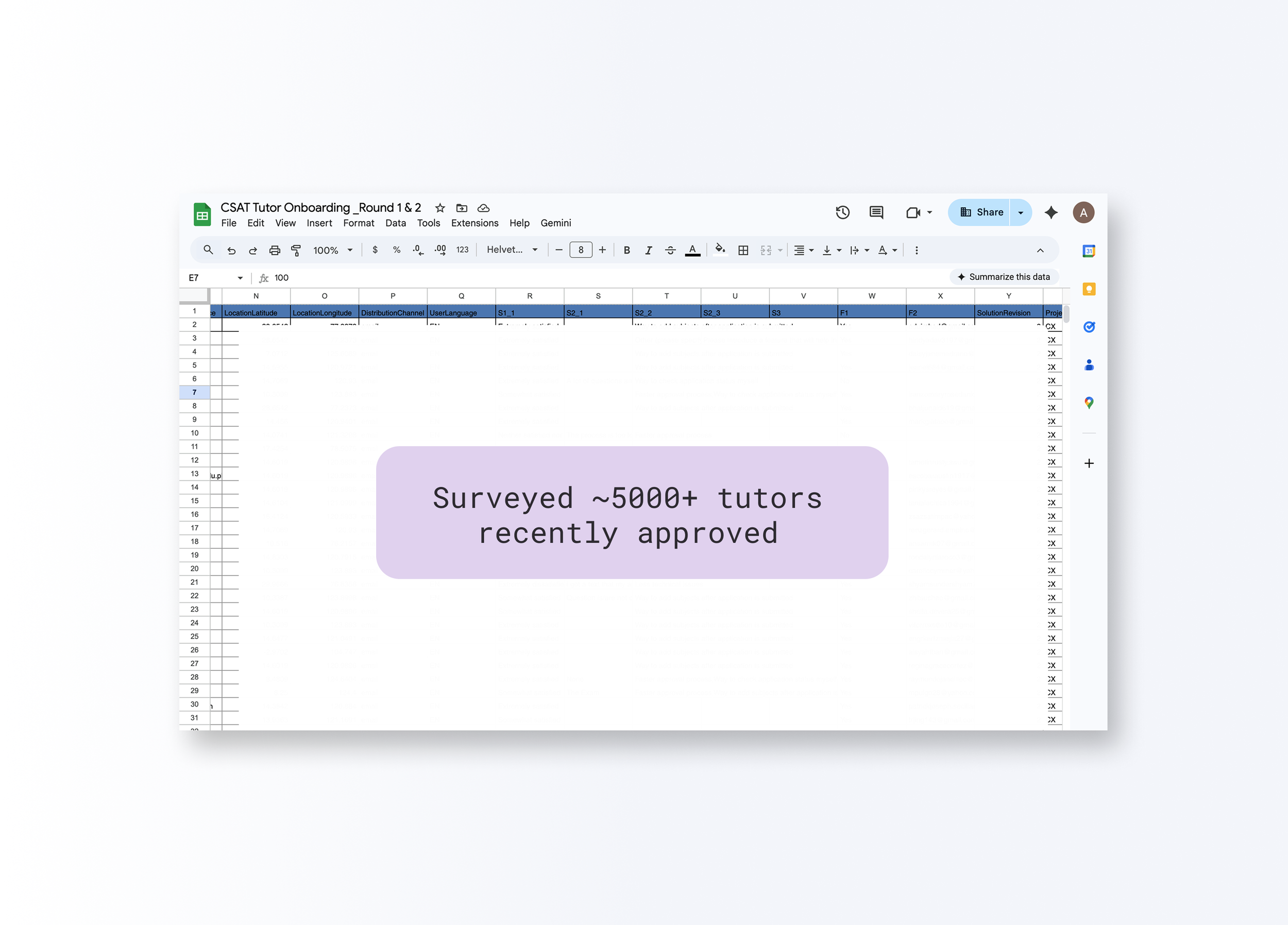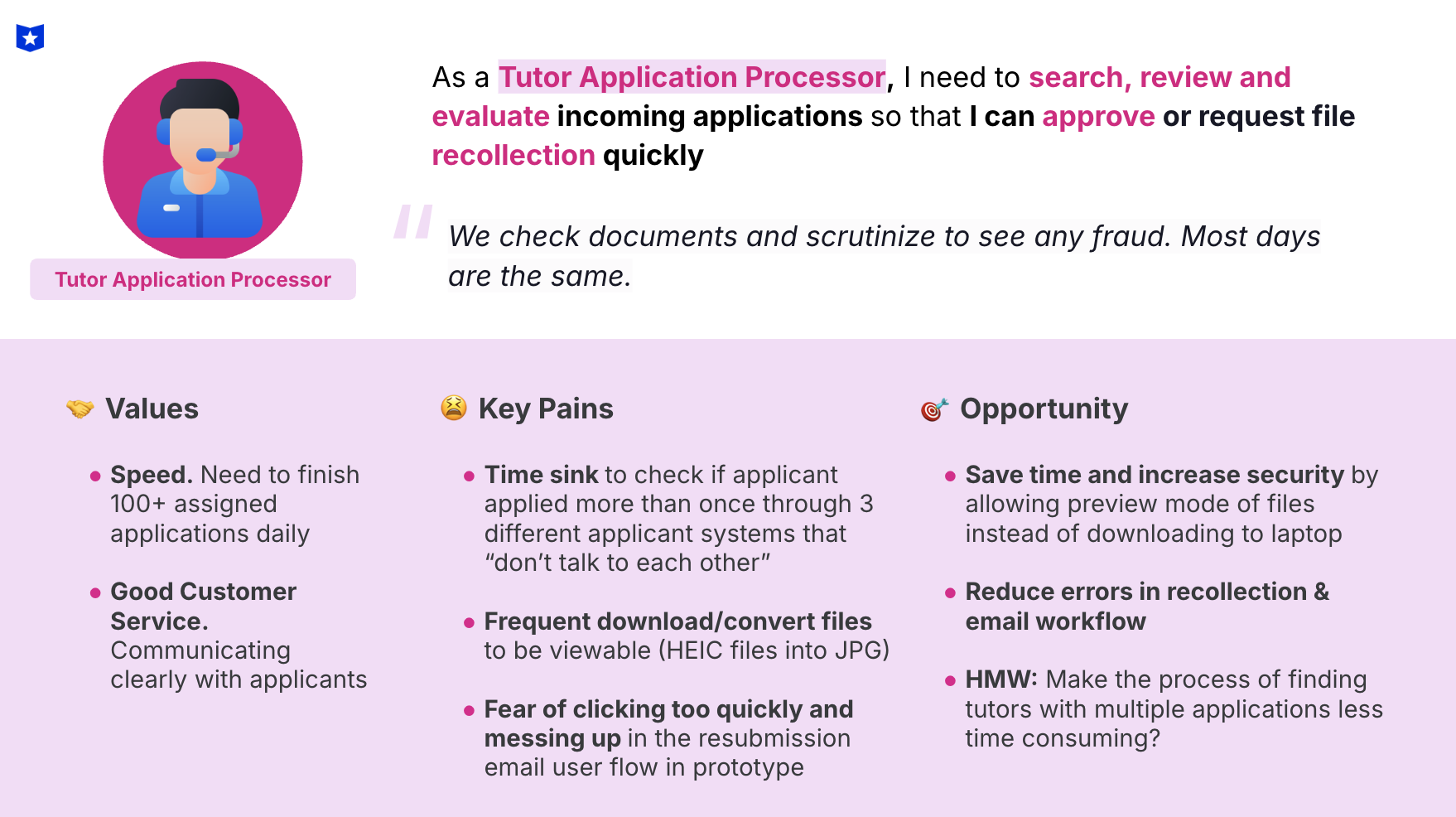Improving the UX Journey with Agents & Customers
Tutor onboarding is one of the most critical funnels of the business as it powers marketplace supply. Yet over time, the onboarding experience became unintentionally fragmented: unclear steps, tool-jumping and inconsistent communication created confusion for tutors and operational burden for staff.
My Role
I stepped in to lead the team to understand from an ecosystem lens of both users - agents and customers - to drive improvements to elevate our onboarding experience.
My responsibilities included:
Reframing the problem from “UI work” to “end-to-end service problem”
Creating Research Strategy to ground decisions on data
Leading collaborative cross-functional workshops
Guiding the team in adopting a service design lens to problem-solving
Teammates
5 Service Owner & Operational Teams
Product Manager
Designer
Engineers
Project Duration
6 months
My Approach
Service Blueprinting Approach by Nielsen Norman Group
For this project, I Introduced a service-design lens that led teams to think beyond their own steps and see the onboarding journey as an interconnected system. I worked closely with PM and Service Owners to scope the project, bring the right teams together and produce a blueprint that could meaningfully influence roadmap decisions.
PHASE 1: ALIGNMENT
I led the creation of a stakeholder map, helping the team see every actor involved - from tutors, reviewers to support agents and system owners. This became the foundation for understanding the key players in the tutors onboarding journey.
Initially the teams were focused on the UI polish on the new onboarding process, but I noticed if we kept going this way for 6-12 months we’d still have slow onboarding and siloed decision-making because no one owned the system end to end.
I reframed the problem from “fix the UI” to an “end-to-end" service problem.”
I worked closely with service owners to identify key stakeholders to include in the project to make meaningful change successful which included front-stage and backstage (operational) staff.
PHASE 2a: DISCOVERY
Understanding the Problem Ecosystem
The Research Focus was:
How might we elevate our tutor onboarding experience with -both our customers and CX teams - across our existing products and services?
Conducting Human-centered Research
Stakeholder Interviews
I conducted 1:1 stakeholder interviews to uncover painpoints:
duplicated work hidden behind system transitions
unclear steps that created emotional friction for tutors
dependencies
overlapping responsibilities that made ownership ambiguous
User Surveys
I launched 2 rounds of customer surveys to take a pulse on the satisfaction with the current onboarding experiences to reveal most desired areas for service improvements.
Outcomes of Survey
Measure tutor’s onboarding satisfaction over time
Uncover areas to prioritize for service improvements
Based on the stakeholder interviews, I analyzed the insights and created Personas which made it easier to quickly digest each team’s goals, behaviours, motivation, and pains at a glance
Creating Personas and User Stories to represent background, motivations, goals and values.
This gave each CX team more visibility of previously unclear upstream and downstream pains and opportunities.
PHASE 2b: OPPORTUNITIES
Mapping the Service
Using early insights from interviews, I built out a rough draft of the service landscape — identifying all actors, systems, and workflows that shape the tutor journey from discovery → application → onboarding → activation.
This exercise surfaced previously invisible backstage dependencies and helped the team understand the true complexity of onboarding.
Collaborative Workshops
To fill in the details, I facilitated a 3hr cross-functional workshop in Miro where staff from different departments worked together to build the service blueprint.
Each team:
Added missing touchpoints
Identified where things broke down
Marked opportunities using shared visual language
Aligned on severity and impact
This participatory approach ensured no single team “owned the truth”, this approach gave every team a voice, and ensured everyone felt ownership of the final blueprint.
Creating the Service Blueprint
For the first time, invisible backstage processes were made visible, helping teams see exactly where tutors experienced friction and where staff processes broke down behind the scenes.
The final output was a high-fidelity service blueprint that visualized the entire onboarding experience:
tutor actions
fronstage interactions
backstage processes
supporting systems
evidence and data
pain points and opportunities
KEY INSIGHTS
Hidden complexity was driving tutor drop off: Much of the friction experienced by tutors stemmed from internal inconsistencies and manual workarounds
Internal teams unintentionally working in silos: The blueprint revealed duplicate steps, unclear ownership, and missing communication bridges between groups
Emotional friction mattered as much as technical friction: Interviews showed tutor confusion, anxiety, and uncertainty during verification - issues analytics alone didn’t reveal
Alignment required a shared foundation for change: The blueprint became a common reference point for PMs, designers, and operational teams - reducing debates about “what to focus on first”
PHASE 3: ROADMAP & IMPLEMENT
Outcomes and Impact
Roadmap Influence: I partnered with the PM to map blueprint insights into MVP v1 and v2 - linking operational pain points with upcoming product requirements.
The Tutor Onboarding Service Blueprint v1 became a foundational artifact for both product and operations:
Informed multi-quarter ATS MVP roadmap by highlighting highest impact issues
Prioritized enhancements with quantitative validation (CSAT + severity/frequency scoring)
Clearly identified opportunities for operational (ex: communication/workflow) vs. product team fixes (ex: system constraints) to speed up improvements
NEXT STEPS
High Value Human-Centered Improvements
To ensure long-term service quality, I recommended:
annual blueprint refreshes to track progress
blueprint as long-term strategy planing tool for Ops and Product teams to ensure data-based decision making
continuing cross functional workshops during major releases
This practice helps the team stay aligned around a scalable, onboarding experience centered around real human needs.
Cross-Functional Leadership Feedback
“Amy spearheaded and designed this important initiative, and it became one of the best collaboration experiences we’ve had at Course Hero.
Her work helped us deeply understand the tutor journey and directly informed the roadmap we’re building.”







